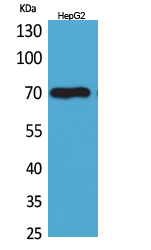
| WB | 咨询技术 | Human,Mouse,Rat |
| IF | 咨询技术 | Human,Mouse,Rat |
| IHC | 咨询技术 | Human,Mouse,Rat |
| ICC | 技术咨询 | Human,Mouse,Rat |
| FCM | 咨询技术 | Human,Mouse,Rat |
| Elisa | 1/20000 | Human,Mouse,Rat |
| Aliases | GPC3; OCI5; Glypican-3; GTR2-2; Intestinal protein OCI-5; MXR7 |
| Entrez GeneID | 2719; |
| WB Predicted band size | 70kDa |
| Host/Isotype | Rabbit IgG |
| Antibody Type | Primary antibody |
| Storage | Store at 4°C short term. Aliquot and store at -20°C long term. Avoid freeze/thaw cycles. |
| Species Reactivity | Human,Mouse,Rat |
| Immunogen | Synthesized peptide derived from the Internal region of human Glypican-3. |
| Formulation | Purified antibody in PBS with 0.05% sodium azide,0.5%BSA and 50% glycerol. |
+ +
以下是关于Glypican-3抗体的3篇参考文献示例(摘要内容基于公开研究概括):
1. **文献名称**:*Glypican-3: A Novel Biomarker for Hepatocellular Carcinoma*
**作者**:Zhu ZW, et al.
**摘要**:该研究验证了Glypican-3(GPC3)抗体在肝细胞癌(HCC)诊断中的特异性,通过免疫组化分析发现GPC3在HCC组织中高表达,而在正常肝组织或良性病变中几乎不表达,表明其作为HCC诊断标志物的潜力。
2. **文献名称**:*Targeting Glypican-3 with CAR-T Cells for Solid Tumor Immunotherapy*
**作者**:Ismail A, et al.
**摘要**:研究利用靶向GPC3的嵌合抗原受体T细胞(CAR-T),在小鼠模型中成功抑制了肝癌和黑色素瘤的生长,证明了GPC3抗体在肿瘤免疫治疗中的应用前景。
3. **文献名称**:*Antibody-Drug Conjugate Targeting Glypican-3 in Advanced Solid Tumors*
**作者**:Ikeda M, et al.
**摘要**:该临床试验评估了GPC3抗体偶联药物(ADC)在晚期肝癌患者中的安全性和疗效,结果显示部分患者肿瘤缩小,提示GPC3抗体作为靶向载体的治疗潜力。
4. **文献名称**:*Glypican-3 Expression Predicts Poor Prognosis in Hepatocellular Carcinoma*
**作者**:Yamauchi N, et al.
**摘要**:通过回顾性分析,研究发现GPC3高表达的HCC患者术后复发率更高、生存期更短,提示GPC3抗体检测可用于预后评估。
---
**注**:以上文献信息为示例,实际引用时需通过PubMed、Web of Science等平台核对原文信息及发表年份。
Glypican-3 (GPC3), a member of the glypican family of heparan sulfate proteoglycans, is anchored to the cell membrane via a glycosylphosphatidylinositol (GPI) moiety. It plays a critical role in regulating cellular proliferation, differentiation, and survival by modulating signaling pathways such as Wnt, Hedgehog, and fibroblast growth factors (FGFs). GPC3 is highly expressed during embryonic development but is largely absent in most normal adult tissues. However, its aberrant overexpression is strongly associated with several malignancies, particularly hepatocellular carcinoma (HCC), making it a promising tumor-specific biomarker.
Antibodies targeting GPC3 have gained attention for diagnostic and therapeutic applications. In diagnostics, GPC3-specific antibodies are utilized in immunohistochemistry to detect HCC and other GPC3-positive cancers (e.g., melanoma, ovarian cancer). Therapeutically, GPC3-directed antibodies are engineered as immunoconjugates, bispecific antibodies, or chimeric antigen receptor (CAR) T-cell therapies. For instance, monoclonal antibodies like codrituzumab and GC33 have been tested in clinical trials for HCC, demonstrating antitumor effects by blocking GPC3-mediated signaling or inducing antibody-dependent cellular cytotoxicity (ADCC).
Despite their potential, challenges remain, including optimizing tumor specificity, minimizing off-target effects, and overcoming resistance mechanisms. Ongoing research focuses on enhancing antibody affinity, developing combination therapies, and exploring novel formats like nanobodies. GPC3 antibodies represent a paradigm shift in precision oncology, offering targeted strategies against cancers with limited treatment options.
×